Hotels vs. Resorts — What's the Difference?
By Tayyaba Rehman — Published on December 6, 2023
"Hotels" are establishments offering lodging to travelers, while "Resorts" are destinations providing recreational facilities along with lodging. Both cater to accommodation needs.

Difference Between Hotels and Resorts
Table of Contents
ADVERTISEMENT
Key Differences
"Hotels" primarily serve the purpose of providing travelers with accommodation, often in urban or transit areas, while "Resorts" are more expansive establishments, often in vacation destinations, offering relaxation and recreational activities.
Most "Hotels" have standard facilities such as rooms, restaurants, and possibly conference rooms; "Resorts", on the other hand, often have a range of amenities like swimming pools, spa services, outdoor activities, and more.
Location-wise, "Hotels" can be found in a variety of places, from city centers to airports, serving short-term needs. "Resorts" typically occupy larger tracts of land in vacation spots, focusing on providing a holistic holiday experience.
The primary objective of "Hotels" is to provide a place to stay, while "Resorts" aim to offer a complete vacation package, from lodging to entertainment.
While both "Hotels" and "Resorts" can range from economical to luxury in pricing, "Resorts" often come at a premium due to the additional facilities and experiences they offer.
ADVERTISEMENT
Comparison Chart
Primary Purpose
Offer accommodation to travelers
Provide accommodation and recreational facilities
Facilities
Rooms, restaurant, possibly a gym or conference rooms
Rooms, multiple dining options, pools, spa, outdoor activities
Location
Urban areas, transit points, various locales
Vacation destinations, often isolated or scenic areas
Duration of Stay
Typically short-term
Often for longer vacations
Experience
Focuses on lodging
Holistic holiday experience with entertainment and relaxation
Compare with Definitions
Hotels
Accommodation facilities often with basic amenities.
The chain of hotels is renowned for its impeccable service.
Resorts
Accommodations with a focus on leisure activities.
All-inclusive resorts are great for hassle-free vacations.
Hotels
Commercial establishments offering rooms or suites.
The new hotels in town have boosted tourism.
Resorts
Establishments offering a comprehensive holiday experience.
Mountain resorts are popular during the skiing season.
Hotels
Places for travelers to stay overnight.
We need to find hotels near the airport for our layover.
Resorts
Large properties often in scenic or isolated locales.
The tropical resorts offer an immersive nature experience.
Hotels
Establishments providing lodging for payment on a short-term basis.
Many hotels in the city were booked due to the ongoing conference.
Resorts
Vacation destinations with lodging and recreational facilities.
The beach resorts are packed during the summer.
Hotels
Properties with facilities like reception, rooms, and often a restaurant.
The hotels along the coast have a beautiful view.
Resorts
Places designed for relaxation and entertainment.
Spa resorts offer a peaceful escape from the daily hustle.
Hotels
An establishment that provides lodging and usually meals and other services for travelers and other paying guests.
Resorts
To turn to or make use of a person, strategy, or course of action for help or as a means of achieving something
The government resorted to censorship of the press.
Hotels
Plural of hotel
Resorts
To go, especially customarily or frequently; repair
"The whale-bone whales can at last resort to their Polar citadels" (Herman Melville).
Resorts
A place frequented by people for relaxation or recreation
A ski resort.
Resorts
A customary or frequent going or gathering
A popular place of resort.
Resorts
The act of turning to a person or thing for help or as a means of achieving something; recourse
Raised the money without resort to borrowing.
Resorts
One turned to or made use of for aid or relief
I would ask him only as a last resort.
Resorts
Plural of resort
Resorts
Infl of resort
Common Curiosities
Is a resort stay more expensive than a hotel?
Often, resorts are pricier due to the added facilities and experiences, but it varies.
Are hotels only in urban areas?
No, hotels can be found in various locations, including rural areas.
Can business conferences be held at resorts?
Yes, many resorts have conference facilities and cater to business events.
Are all resorts located by the beach?
No, resorts can be beachfront, mountainous, or in various scenic locales.
Do all hotels have restaurants?
While many do, not all hotels have restaurants; some might only offer breakfast.
Do all hotels have room service?
While many do, not all hotels offer room service.
What's the difference between a hotel room and a suite?
A suite typically includes multiple rooms, like a living area, while a hotel room is a single room.
What is an all-inclusive resort?
It's a resort where one payment covers lodging, meals, and often other activities.
Are there adults-only resorts?
Yes, some resorts cater exclusively to adults, offering a specific ambiance.
Are pets allowed in resorts?
It varies; some resorts allow pets, while others don't.
Can I get a hotel room for a few hours?
Some hotels offer hourly rates, often referred to as "day use" rooms.
What activities can I expect at a beach resort?
Activities like water sports, beach volleyball, spa services, and themed dinners are common.
Do hotels provide transportation services?
Some hotels offer shuttles or transportation, especially if they're near transit hubs.
What are luxury resorts?
They're high-end resorts offering premium services, facilities, and accommodations.
How do boutique hotels differ from chain hotels?
Boutique hotels are often smaller, with unique designs and personalized service, while chain hotels maintain a consistent brand standard.
Share Your Discovery

Previous Comparison
Middle Class vs. Upper Class
Next Comparison
Pronoun vs. Proper NounAuthor Spotlight
Written by
Tayyaba RehmanTayyaba Rehman is a distinguished writer, currently serving as a primary contributor to askdifference.com. As a researcher in semantics and etymology, Tayyaba's passion for the complexity of languages and their distinctions has found a perfect home on the platform. Tayyaba delves into the intricacies of language, distinguishing between commonly confused words and phrases, thereby providing clarity for readers worldwide.












































